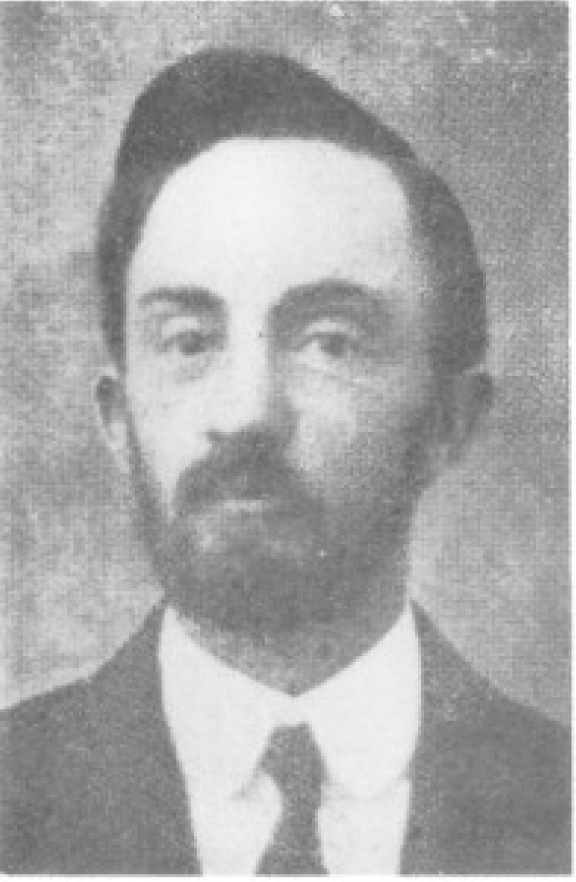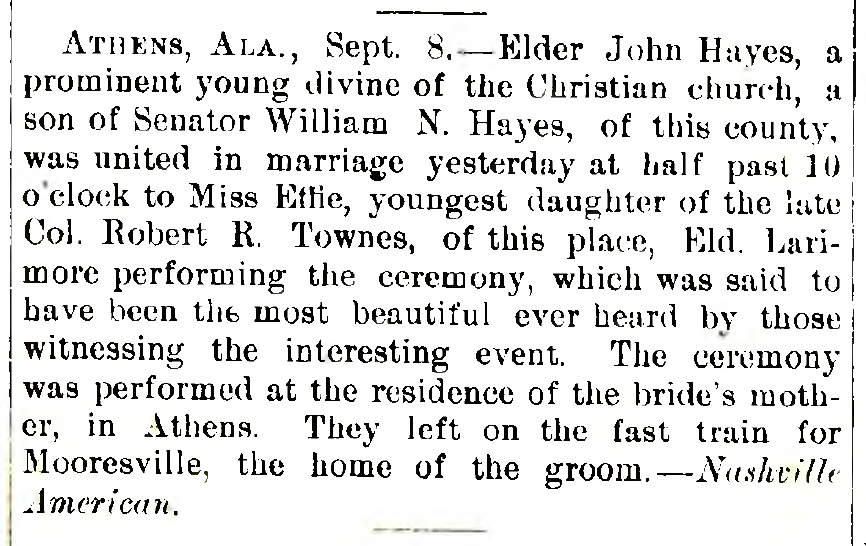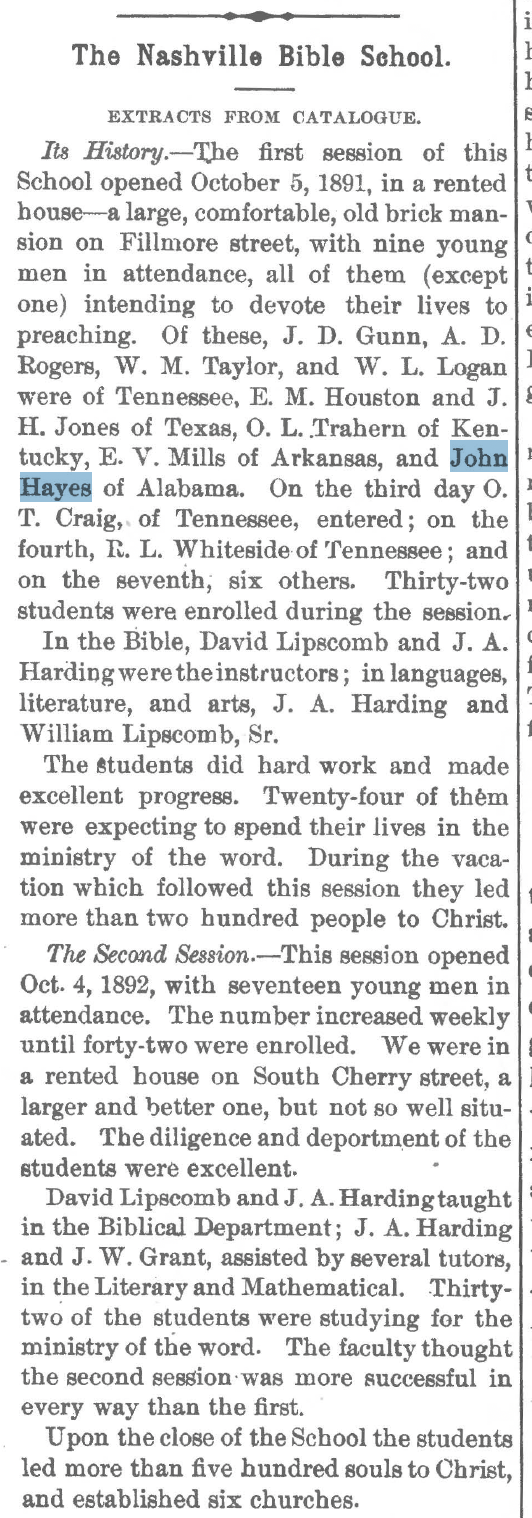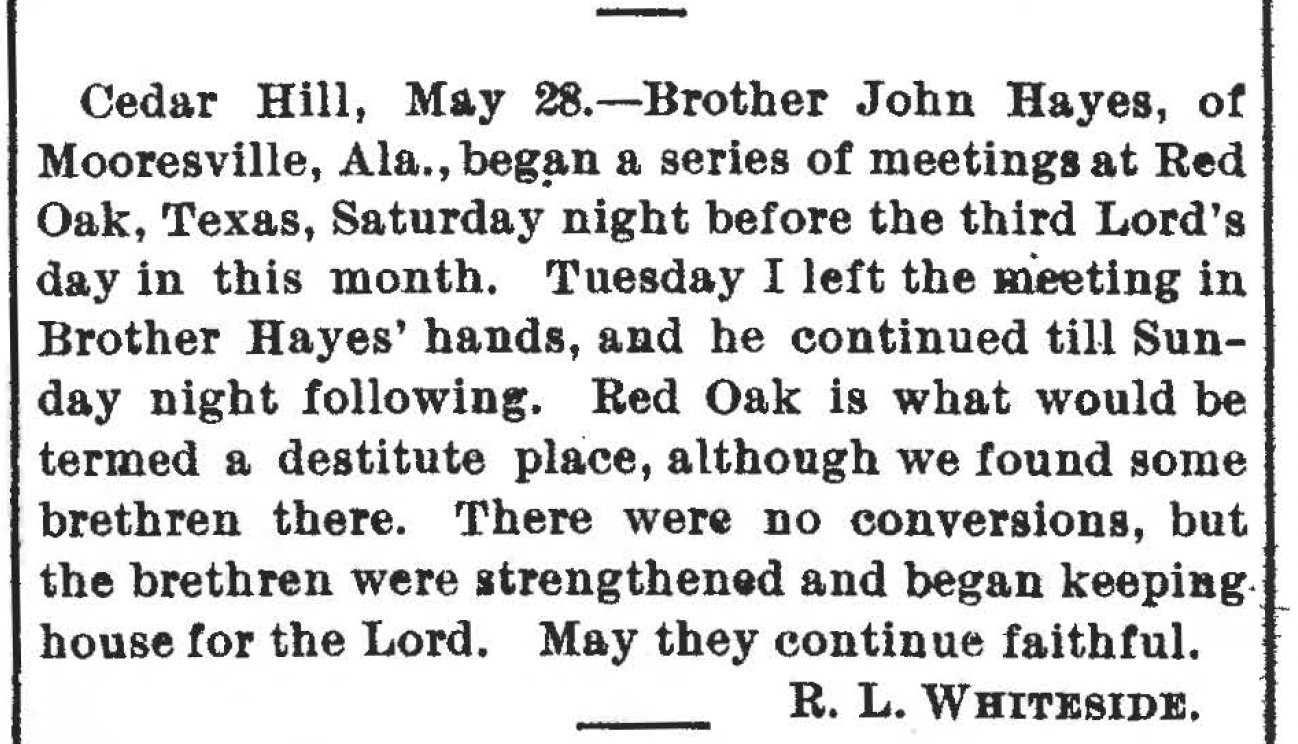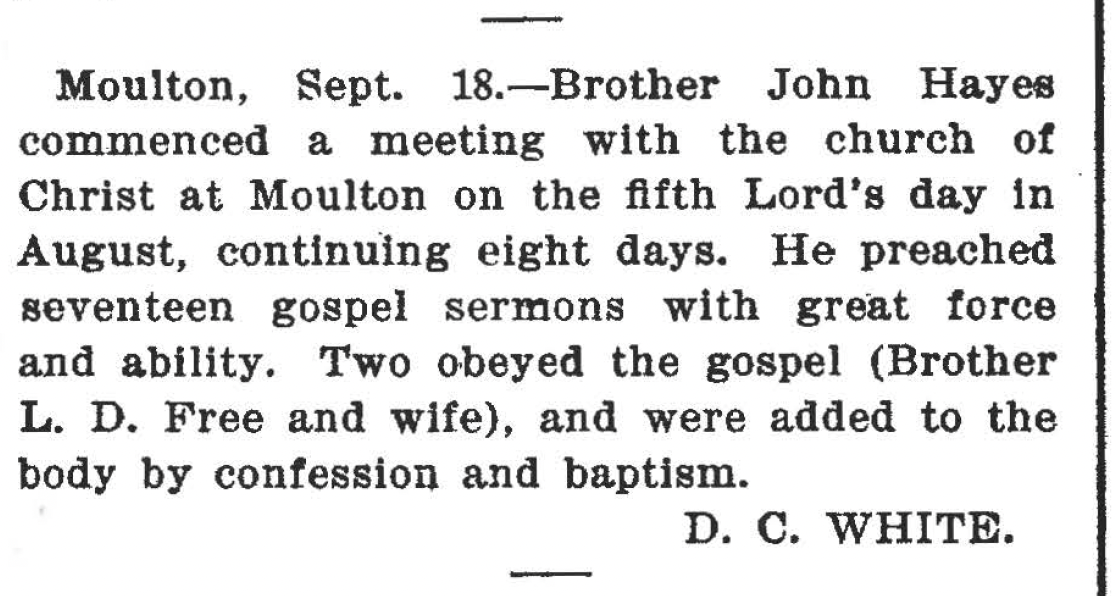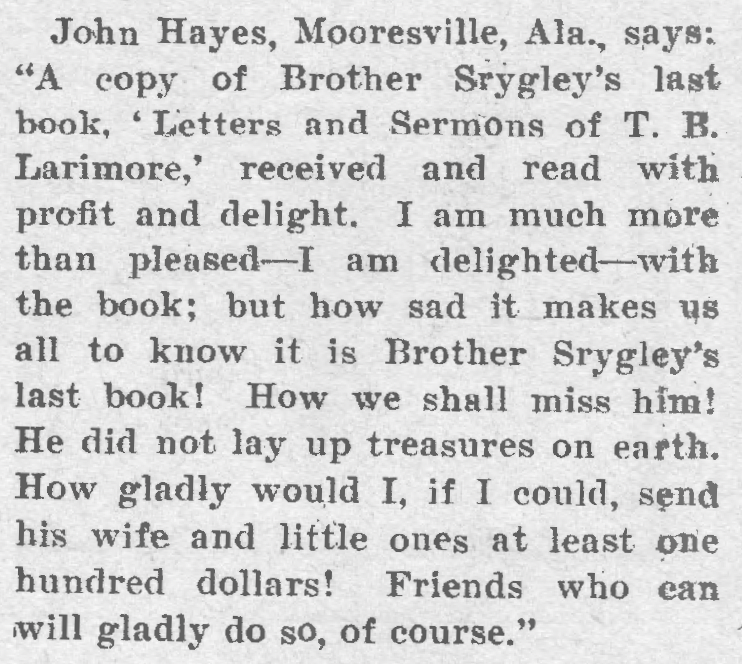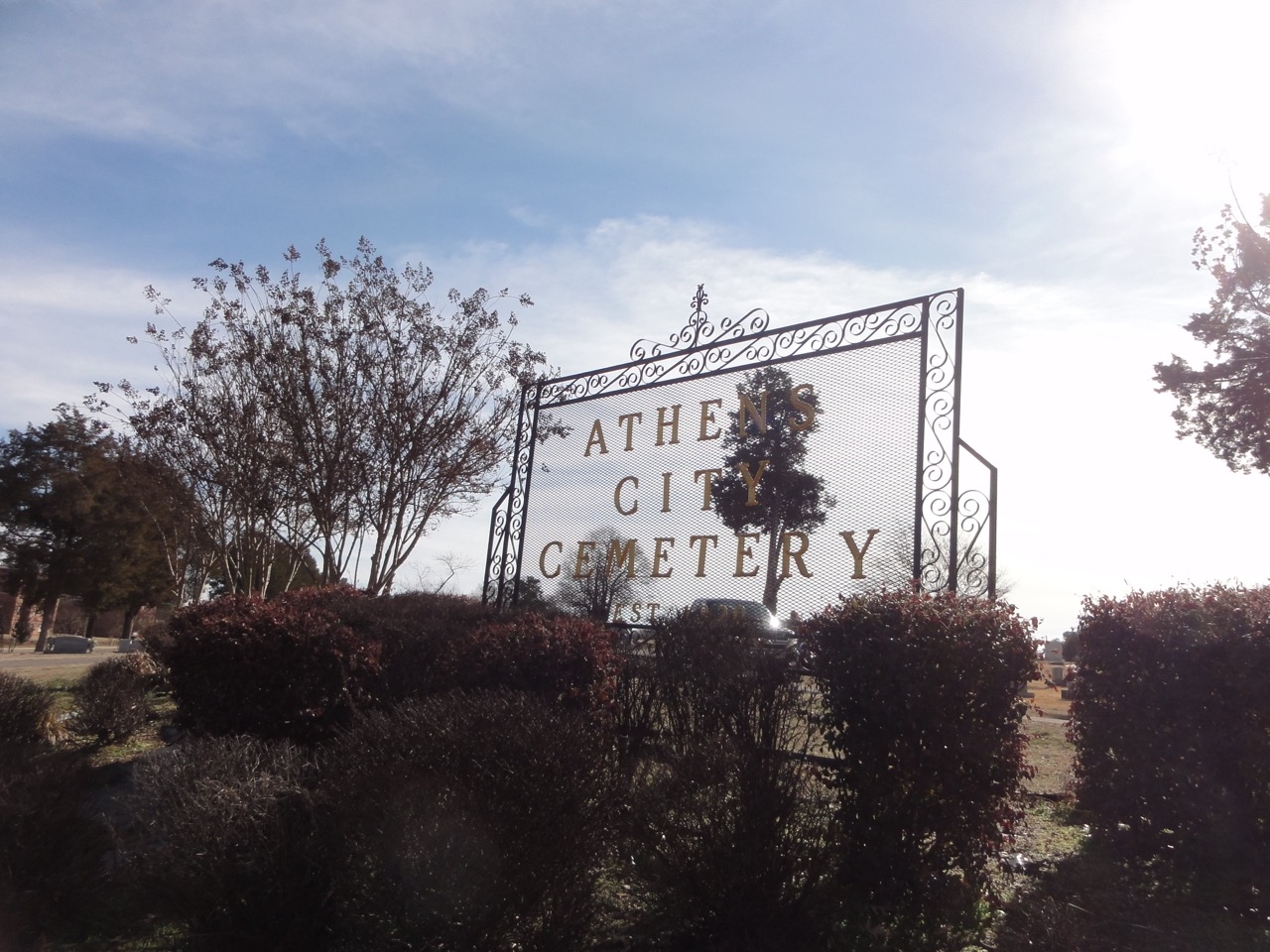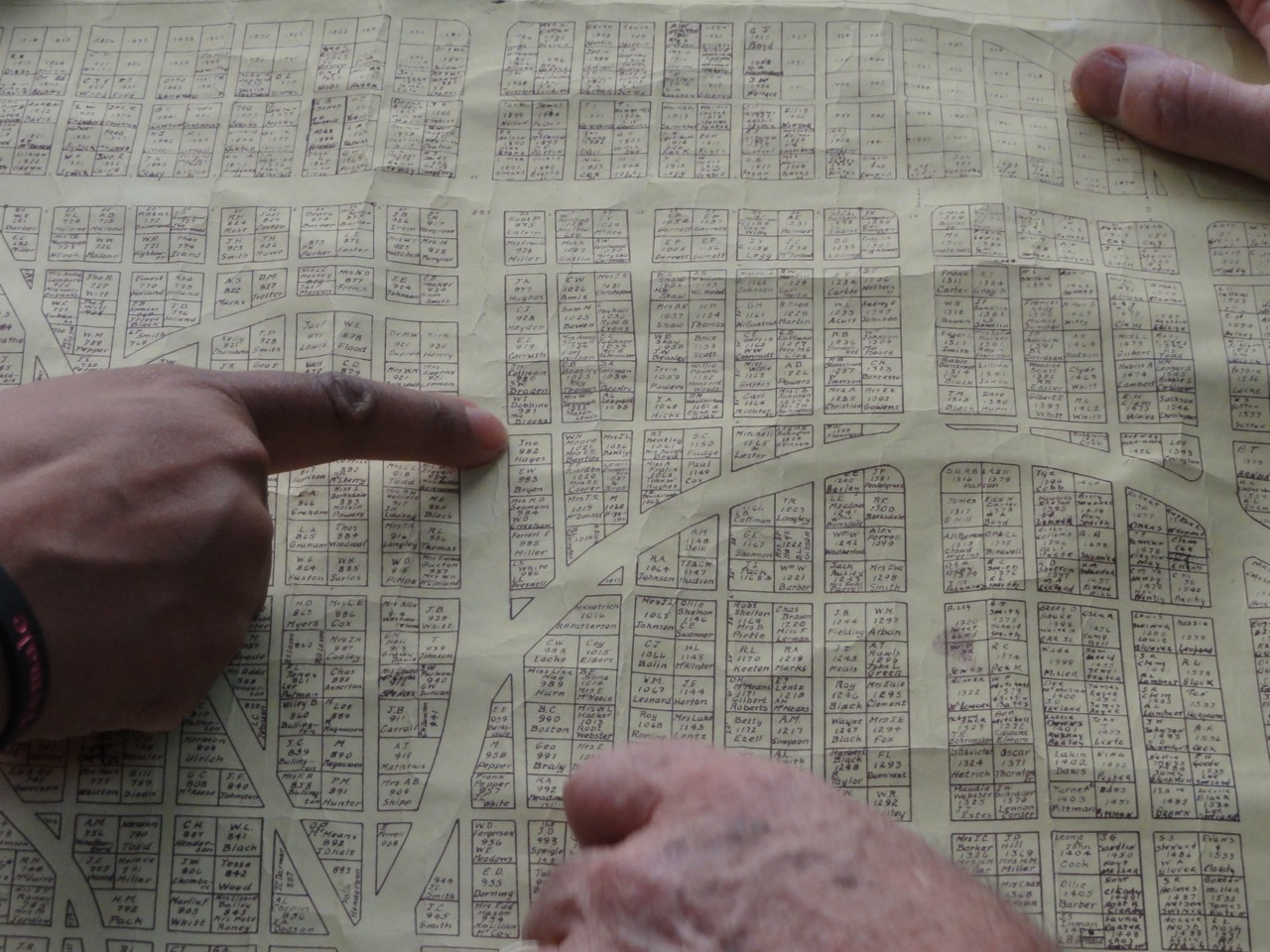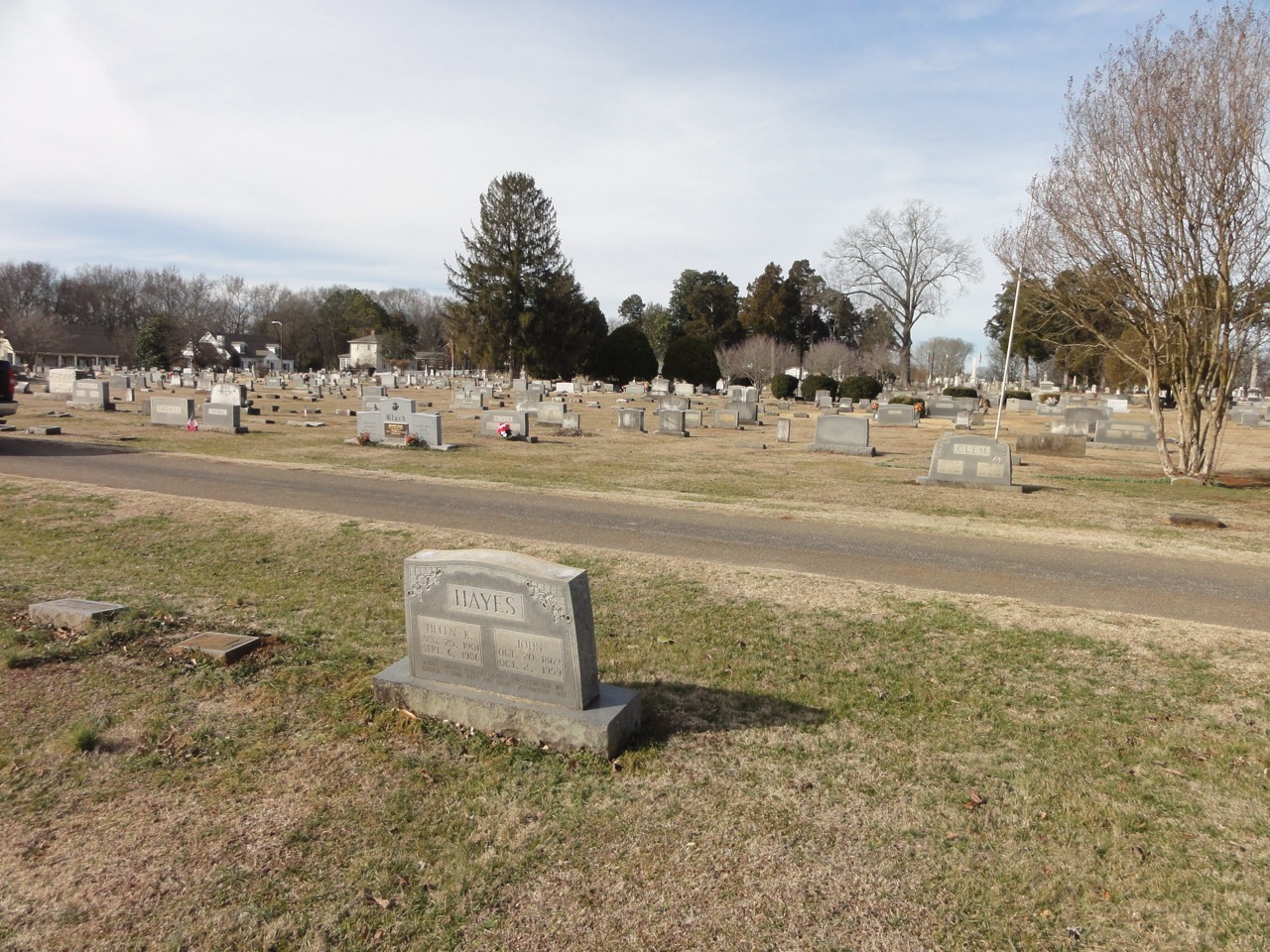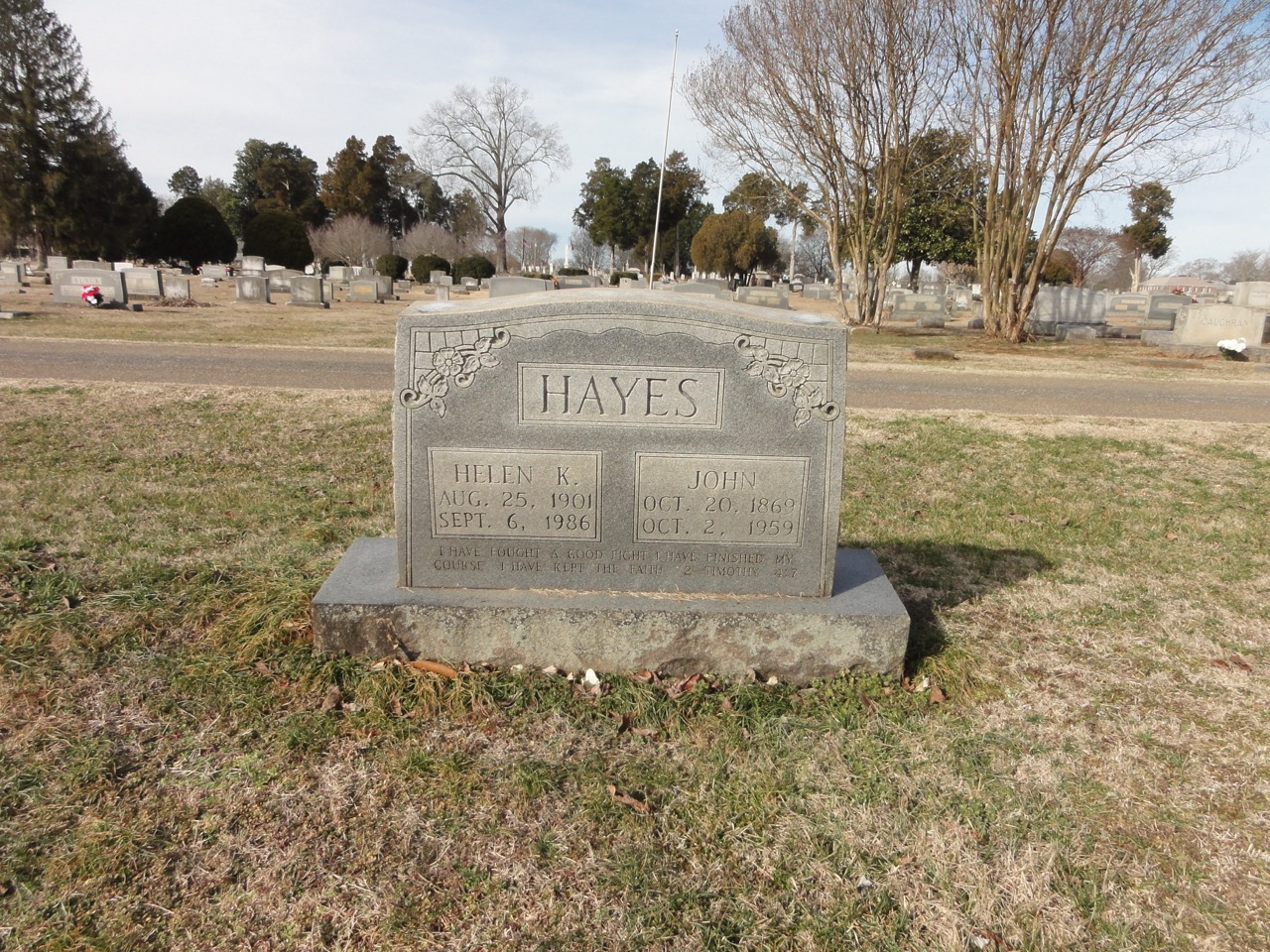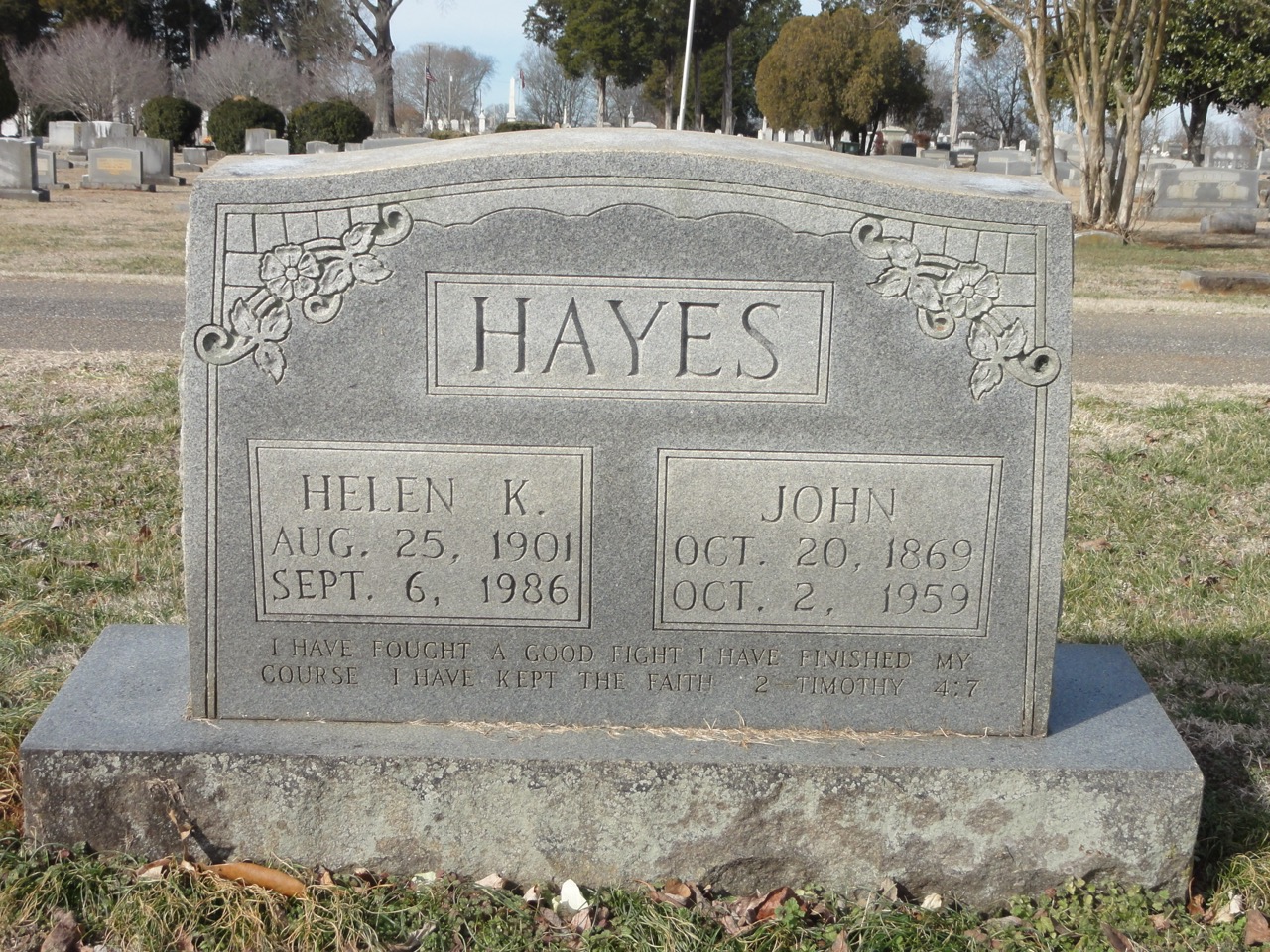John Hayes
1869-1959
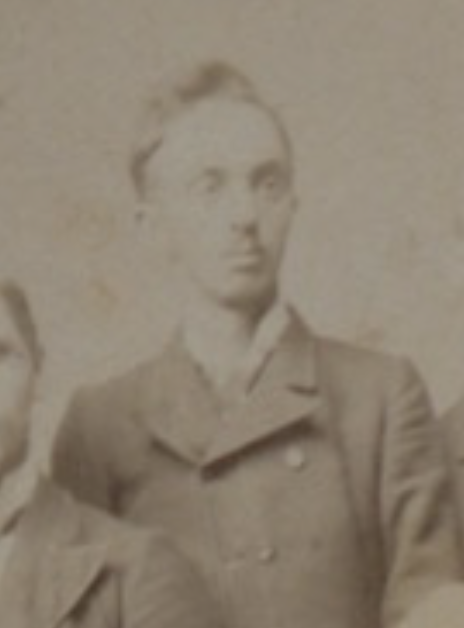
Source: Creative Commons
![]()
The Life of John Hayes
John Hayes was born October 20, 1869, in Mooresville, Limestone County, Alabama. He was the son of William Norfleet Hayes (1839-1918) and Mary Eliza Hussey (1844-1926). He was the middle child of seven children, three girls and four boys. His father served as an Alabama State Senator for the district. In later life, he was a Judge.
Young John grew to manhood in his hometown. It was not until his seventeenth year that he responded to the gospel of Jesus under the preaching of T. B. Larimore. Baptized into Christ, he took very seriously his relationship with his Lord.
John was among the first six of nine students that arrived the day Nashville Bible School opened October 5, 1891, and the only one from Alabama. By the end of the first session there were thirty-two students in all. (GA, 06.07.1894, p. 362) In a letter to E. A. Elam many years later, he wrote, "My grandfather was a subscriber to the Gospel Advocate from the first issue until his death; then my mother kept it coming to her until I accepted Christ as my Savior. For the last eighteen years I have read it regularly, and appreciate its worth in helping me to know more about the word of God. It was in its columns I read with joy the proposed opening of the Nashville Bible School. Through the kindness of Brother W. H. Dodd and Brother Lipscomb, I was present the first day of its beginning (there were only six the morning it opened), and for nearly three years I was a constant student. The instruction and training I received there I would not exchange for a world like this. I have watched with pleasure the success of the school, and it makes me sad to have to see appeal after appeal for its aid. How I wish for thousands to place to its credit! I am sending you one dollar. I make the following suggestion to every former student of the school: Let every one pledge himself or herself to give one dollar every year for ten years, or for life, to its support. Here is my heart and hand for my dollar regularly every year for ten years. I feel sure that if every student will respond to this appeal, it will make quite a liberal sum for the school." (Gospel Advocate, 12.19.1907, p.801).
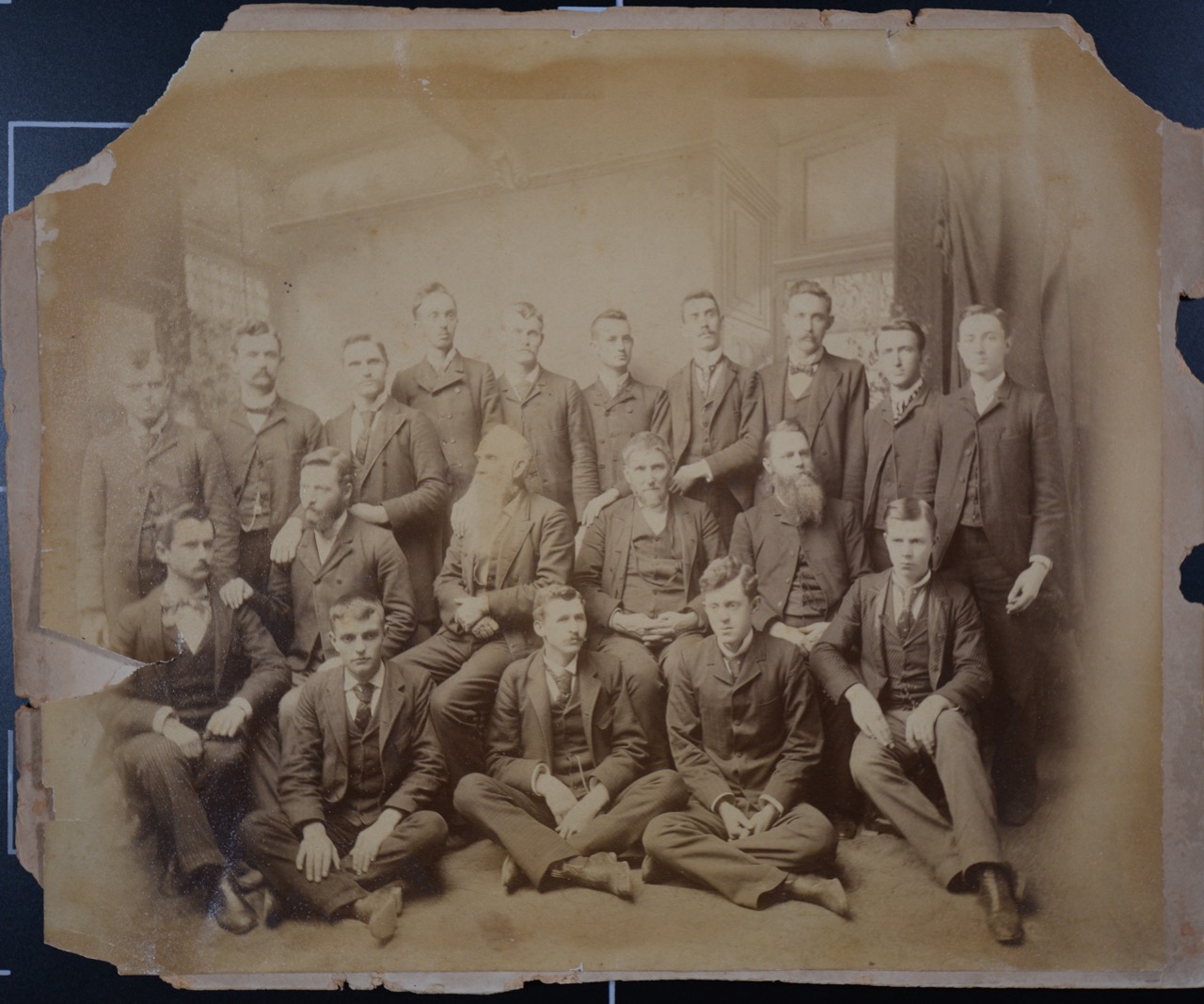
First Faculty and Student Body at Nashville Bible School - 1891
Top row, from left: Unidentified, Edward Vernon Mills, A.D. Rogers, John Hayes, Will Logan, William Sisco, William Marcus Taylor, O. L. Trahern, 2 unidentified
The four seated, center from left: Paul Hays, William Lipscomb, David Lipscomb, James A. Harding,
The five seated front from left: Eugene Houston, Leon Harding, O.T. Craig, Dan Gunn and unidentified
Source: Creative Commons
While in school, John married a girl from home, Effie Davis Towns (1873-1903), on September 7, 1892. The couple were blessed with four children, Mary Hayes (1893-????), Thomas Lawrence Hayes (1896-1918), and two other girls who died in infancy.
In April 1897, he began representing the Gospel Advocate as a field agent. In a note in the April 15th issue, the editor said, "Brother John Hayes, of Mooresville, Ala., is authorized by us to act as agent for our publications. We hope the brethren will receive him as a worthy brother in Christ, which he is. Any favors shown him will be appreciated by us." (Gospel Advocate, 04.15.1897, p.232). In a later issue, he wrote, "Wherever I go, you may depend on my always speaking and working for the Gospel Advocate, and I pray God to bless its editors with long lives and clear heads to battle for the Christ and his kingdom.—John Hayes." (Gospel Advocate, 12.21.1899, p.805).
Sorrow came to the home of the Hayes family with the passing John's young wife, Effie. James E. Scobey wrote the kind obituary that appeared in the Advocate. He expressed, "On August 24, 1903, at Mooresville, Ala., a sweet-spirited woman passed the portals of death and, we trust, entered upon a higher and better life than earth can afford. Effie Davis Hayes (nee Townes), wife of Brother John Hayes, after weeks of suffering, during which she manifested the most beautiful, patient, Christian fortitude, closed her eyes in death. She was born in Jonesboro, Ill., in 1873, and came to Athens, Ala., with her parents when seven years old. She was reared in the Episcopal Church, but under the preaching of Brother William Lipscomb, Jr., she obeyed the gospel in 1892. After she became a Christian, she was always noted for her Christian graces. She loved the saints and the assembly of the saints. She was an affectionate and dutiful wife; understanding clearly her domestic duties and recognizing her responsibilities, she labored to make her home happy. She loved her husband and their two children—a daughter, nine years old, and a son, seven years old—who survive her with an ardor born of the most devoted affection. She married Brother Hayes at Athens on September 7, 1892. She was conscious of her approaching death, and earnestly besought those at her bedside, especially her husband and children, to meet her in the "sweet by and by." Besides her immediate family, she leaves a mother (Mrs. Kate L. Townes), two sisters, three brothers, and a host of other relatives and friends to mourn her death. She was buried at Athens, where a short service was held by Brother Marshall. "Blessed are the dead which die in the Lord from henceforth: Yea, saith the Spirit, that they may rest from their labors; and their works do follow them." Let those who mourn find comfort in the assurance of hope that their loved one died "in the Lord." May the Lord's blessing rest especially on the bereaved husband and the motherless children, and may they ever trust him. (James E. Scobey, Gospel Advocate, 10.29.1903, p. 703).
Sometime around the end of 1904, John Hayes moved to Southwest Texas. He lived in DeSoto, Dallas County, and preached around the country. When not preaching he supported himself by working in a dry-goods store and from time to time painted houses. A report was sent to the Gospel Advocate by J. B. Newhouse of Self, Texas, concerning a gospel meeting conducted by John Hayes, where it was reported, "The audiences were very attentive. Brother Hayes did some good preaching, and the church was strengthened and encouraged and agreed to keep house for the Lord. Any church desiring a preacher would make no mistake in getting Brother Hayes." (Gospel Advocate, 08.18.1904, p.525).
It is uncertain as to the date of his second marriage, but he married a young woman by the name of Florence Oliver (1880-1917). Little is known of her family or place of birth. It seems he met her while in Desoto, Texas. On June 26, 1906, she gave birth to a son, John N. Hayes (1906-1920). Then, she gave birth to a daughter, Ruth Hayes (1908-1997), and then to another daughter, Florence Hayes, who died in childbirth in 1910. And finally, another daughter was born, Glady I. Hayes (1913-1998). According to his obituary, there was another child born to this couple, five in all.
Soon, he moved and settled in Uvalde. In May of 1905, he held a debate with a Baptist preacher by the name of E. S. Haynes. A discussion report is as follows: "Debate at Desoto, Texas. On Lord's-day night, April 9, a six-days' debate closed at this place between Brother John Hayes (Christian) and E. S. Haynes (Baptist). Brother Hayes affirmed that the church of Christ is scriptural in origin, doctrine, and practice. Elder Haynes denied the proposition. We all rejoice that the truth was upheld, and the doctrines of man exposed in such a way that good will result. Brother Hayes is a young man, and this was his first debate, but we are all proud of his work in the investigation of the Scriptures. Elder Haynes is over sixty years of age, and has been preaching forty years; but, with his long experience, Brother Hayes tangled him up several times. Brother Hayes forced him to admit that the name they wear is unscriptural, and that they had no scripture to support their practice in voting as to whether penitents should be admitted or not. Elder Haynes admitted that baptism was necessary to salvation. He also said that he did not approve of the mourner's bench. Many in the audience admitted that Brother Hayes had Elder Haynes badly worsted from start to finish. A very amusing incident occurred on the last night of Elder Haynes' last speech. When he had spoken about seven minutes on his last half-hour speech, he stopped and asked the moderators how much time he had, and the Baptist moderator quickly replied that he had pretty well all of it. He labored on eight minutes longer and said he was done, and he was "done up." Everything passed off nicely, with nothing to mar the kindly feelings existing from the start. We rejoice that the truth was vindicated, and we feel sure that good will result from this debate. There were large audiences every night, and the last night over six hundred persons heard the closing speeches. Brother Hayes certainly acquitted himself grandly, and showed that he is well versed in the Scriptures. He did not seek this debate, as he had never before debated; but the way he handled the Scriptures and controverted points led many to think that he was an old debater. -J. B. CATHEY. (Gospel Advocate, 05.18.1905, p.318).
John reported on meetings in Ballinger, Zephyr, Selfs, and Ozona in Crockett County, Texas, in 1907. G. W. Newman, reporting on meeting at South Ballinger, wrote of him, "Brother Hayes is a very forcible speaker and possesses that happy faculty of winning the confidence and respect of his hearers, and carries with him the love and prayers of the church." (Gospel Advocate, 11.28.1907, p.445).
In 1908, he reported on meetings in Peerless, Hopkins County, Hooker, Kaufman, and Lone Oak, Hunt County, Texas. While at Lone Oak, John entered into a debate with J. M. Lawrence, a Missionary Baptist, on the following propositions, "(1) The point at which salvation, or remission of sins, is received—that is, whether before or without baptism or in baptism; (2) the establishment of the church; (3) apostasy." (Gospel Advocate, 08.06.1908, p.507). In a report sent in under the title, "Lawrence-Hayes Debate," L. C. Reeves recounted, "Of course truth triumphed over error. Brother Hayes did some excellent work in this debate, pressing his opponent until he asserted that salvation in Mark 16:16 is not predicated upon either faith or baptism. In the main, the usual arguments were presented. Brother Hayes makes no boasts as to debating but stands ready to defend the truth. His Christian deportment in this discussion was very commendable. We feel that much good was done, and hope that a bountiful harvest may be reaped in the near future. The writer was Brother Hayes' moderator. Brethren, If you need the services of a humble preacher of the gospel, call Brother Hayes. His address is Cedar Hill, Texas, Route 1." (Ibid.). From this effort, John reported a result of seventeen baptisms and three restorations. (Gospel Advocate, 08.27.1908, p.549).
In 1909, he reported meetings in Desoto, Donelton, near Lone Oak, Commerce, and Terrell, Texas. In 1910, he reported returning home to Huntsville, Alabama, where he preached in a gospel meeting every night while attending to one of his children who was sick each day. (Gospel Advocate, 03.24.1910, p.368). The child had suffered appendicitis and succumbed to his illness and passed away. John reported to the Firm Foundation of the loss of his child. (Firm Foundation, 03.08.1910, p.5). In May, he preached at a meeting at Wills Point, Texas. (Firm Foundation, 06.14.1910, p.5). In July and August, he held meetings at Hook Ridge, Hunt County, Kossee, Cherry Grove, and in Milan County. In September, he was in Leon County. Then he went to Harper. In 1911, he reported on efforts at Milam and in Hunt County.
In 1912, he went to Florida and preached meetings at Trenton, Fidelity, Hildreth, Santa Fe, Midway, Branford, and Cherry Sink. He held a meeting in Morven, Georgia, in early May. Then, he reported meetings in Alabama, at Newton, Christian Home, Keyton, and Dallas Mills, near Huntsville. John A. Jenkins reported at Dallas Mills, "Brother Hayes began a meeting at this place on June 2 and continued it until June 16, preaching at night only, except on Lord's Day. As a result of this meeting there were seventeen additions to the congregation—thirteen by primary obedience, two wanderers restored, and two by membership. This, we believe, was one of the best meetings, if not the best meeting we ever had. The last night of the meeting, the house was crowded. Brother Hayes won the love and respect of all, and we regard him as one of our very best preachers. We pray that God may spare him many years and give him health and strength to proclaim the unsearchable riches of Christ to those who are sitting in darkness. The brethren should remember their duty and hold up hands wherever he goes. We hope to have Brother Hays with us again next year." (Gospel Advocate, 06.27.1912, p.765). By the end of July, he had headed back to Texas. There, he reported meetings in Lebanon, near Rockdale, Laneport, Ledlow, and at Crisp in Ellis County. In September, he returned to Huntsville and conducted meetings at Hurricane Mills, Merrimack Mills in West Huntsville, and Dallas Mills in East Huntsville. From there, he returned to Trenton, Florida, to hold meetings. While in that state, he was a Cherry Sink at New Hope, near Lake City, and at Lecanto. In January 1913, he was at Winter Park, where he preached nine sermons in the Methodist meetinghouse. (Gospel Advocate, 01.09.1913, p.37). By the end of January, he reported returning home after nearly four months of preaching in Alabama and Florida. (Gospel Advocate, 02.06.1913, p.132). In June, he made another trip back to Alabama, where he preached at Christian Home in Newton, and then made his way to South Carolina to preach, "where they never heard a gospel sermon." (John Hayes, Gospel Advocate, 06.12.1913, p.566). It was said that while in Pickens County, South Carolina, he "was the first gospel preacher to plant the cause in that part of the country." (E. M. King, Gospel Advocate, 06.26.1913, p.613). The train heading east stopped in Atlanta, Georgia, where he was met by S. H. Hall, who asked him to preach "at the tent" for the West End Avenue church. (S. H. Hall, Gospel Advocate, 06.26.1913, p.613). Hall and Hayes had been fellow students at NBS and were good friends and co-workers. While on the train, John wrote, "I am now on my way to Liberty, S. C., to begin the mission meeting at the former home of Brother Gantt. While a few have responded to the call to support this work, yet not enough to support it as it should be. I will have to pay rent for the school building and lights. Will do the cleaning up of the house myself. My home will be with a Baptist family that wants to hear a gospel preacher. I realize my unworthiness and ask for the prayers of the saints." (Ibid. p.614).
Writing from Liberty on June 30th, John shared, "I am entering the third week of my mission work here. Last night we had our first real good audience. This is truly a mission field, and one can scarce refrain from weeping when he sees with his own eyes such conditions in this so-called "Christian land." The people are absolutely ignorant of the proper division of God's word, and just as soon as their leaders found out we were coming, they commenced to poison the mind and create a prejudice against hearing me. We are in the spirit of our Lord sowing the seed and are glad to notice a few who are drinking earnestly from the fountain of life. I have written to each one personally that has fellowshiped this work; and if they could see this field, they would truly rejoice in having fellowshiped this meeting. God bless you all." (Gospel Advocate, 07.10.1913, p.661). He preached in the schoolhouse at Liberty for about ten days, and the balance of the time preached in a grove about three miles north of Liberty without any actionable response. (W. N. Gantt, Gospel Advocate, 11.27.1913 p.1162.).
By mid-July, he was heading back toward Texas and stopped for meetings near his home, one in Sheffield and another in Huntsville. By mid-month, he was at a campground meeting in Loneport, Texas. He quickly returned to Alabama, preaching again at Sheffield for twelve days and back in Huntsville for a meeting at Merrimack Mills.
In June of 1914, an appeal came from A. C. Miller of Waxahachie, Texas, on behalf of John Hayes about a mission effort he was preparing to begin in South Texas. He wrote, "Brother Hayes lives not far from me, and I can say his standing among his brethren and neighbors is the best here at home. He needs outdoor exercise and must change his location and give up his position in a dry-goods store on that account. Brother Hayes preaches regularly and in the summer continuously, but part of the year, it has been his custom to "work with his hands." I earnestly suggest to the brethren to help him just now to raise one hundred dollars for the first payment on a modest little farm home. It will require all his means after selling his little house and lot in his home village, Desoto (on Route 1, Cedar Hill, Texas), to meet obligations and buy tools, a small team, etc., in South Texas in a new country where there is a colony of about forty people, part of whom are brethren, and all are poor home seekers. It is his idea to stay there, make his own living, and teach and preach at home. I can say from seven years' experience that it is very effective work he contemplates. Brethren, let us immediately donate a dollar or two apiece and start Brother Hayes in the new country before error gets grounded in that new settlement in South Texas. Address John Hayes, Cedar Hill, Texas, Route 2." (Gospel Advocate, 06.04.1914, p.609).
In the summer of 1914, John reported on missions in Texas at Somerville, Pattonville, Marquez, and Riley Springs. To go to Riley Springs, he reported that he had to get a job painting houses to pay off debts so he could travel. While at Riley he baptized seven and established a congregation with 18 members. While there, he was called by a brother to come and preach somewhere else where there was need. So, he appealed to the brethren to support the work. In October, he was reported to be in Yantis, Texas. In early 1915, he traveled to Ennis, Texas. In April, a report came that asked for prayers. It said, "Remember John Hayes, of Cedar Hill, Texas, in your prayers. He has been sick for several weeks with stomach trouble and is now at Mineral Wells seeking to regain his health." (Gospel Advocate, 04.22.1915, p.388). While recuperating, he held a three-week meeting there and wrote, "Let me wear out, but never rust. I am going to get well during these three weeks. Pray for the meeting. The Canaanites are in the land and, I fear, a few Campbellites. But I expect to 'preach the word' by the help of Jehovah." (Gospel Advocate, 05.13.1915, p.468.) His next report was of a meeting in Scurry, Texas, that closed on August 11 with 32 baptisms, 11 restorations, and 2 who placed membership. (Gospel Advocate, 08.19.1915, p.828). While there, he was challenged to a debate, but referred the Methodist minister to reach out to C. R. Nichol "for dissection and enlightenment." (Ibid., p.829). In the next issue of the Advocate, the editor noted, "Churches would do well to have fellowship with John Hayes in his meetings in Western fields. This faithful brother, although weak and broken in health, is preaching constantly in such places. In this same issue, he reported a meeting just closed with thirty-five additions. He is now in another meeting without promise of support. Read his letter and act promptly: "l will begin my second mission meeting on the fourth Lord's day in August, to continue as long as the interest demands. I have a note at the bank due on October 1, and my health has been such that I could not labor with my hands for support. Two different places arranged with me in the spring for summer meetings and then turned me down. One of them promised to support me in a mission meeting and failed to do so. I have put in the time in mission work, and now I am compelled to make this appeal. Who will read this and heed the call? I have been a sick man since April and have to take medicine almost every day to keep going. Will you let me fail to meet this note? The time is short, and my heart is troubled over this. I am to spend three weeks or longer with a tent in Palestine with a small band of loyal Christians. We are hoping and praying to establish a strong congregation there. Brother, sister, don't turn this down. Write me at Cedar Hill, Texas." (Gospel Advocate, 08.26.1915, p.861).
In early 1916, John traveled again to Georgia for a mission. He stopped in Hazlehurst for a meeting. He continued preaching there for three or four weeks. In February, he participated in a debate with J. B. Davis, a Baptist. The debate lasted four days, with two sessions held each day. The discussion centered around how to be saved and apostasy. All the time there, the work at Hazlehurst struggled, and he worked hard to build it up, though only four members made up the church. In March, he went from there to Rome, Georgia. In May, he reported a meeting in Kemp, Texas. In July, he was back in Scurry, Texas for a meeting. Then, in September, he traveled back to Georgia for a meeting in Rome. W. F. Duncan reported, "Brother John Hayes has just closed one of the best meetings in the history of the church and began tonight another meeting in North Rome, in a rented hall. Rome is a city of twenty thousand. We need a preacher to work here in Rome all of his time, but we are not able to support one. With the help of twenty-five dollars a month from the brotherhood, we can keep Brother Hayes busy right there in Rome. We are all poor and work for wages, but we propose to sacrifice and keep Brother Hayes half of his time. But a greater work can be accomplished by keeping him right here in meetings and house-to-house work. Brethren, shall this city be neglected?" (Gospel Advocate, 09.21.1916, p.951). By the end of September, John was preaching at a meeting in Cedartown, Georgia. In November, he conducted a meeting in Rockmart.
During the first part of 1917, brother Hayes made for Bells, Florida, for a meeting. In early March, he conducted a meeting in Gainesville. Later in the month, he made a passionate plea to the brotherhood through the Gospel Advocate for good brethren to help him pay off a $75 loan he made the previous August, $50 of which he left to support his family and $25 used for fares on railroads and food to travel and preach. The money was due to be repaid, and he needed a donor to assist him in paying off the loan so he could continue to preach in mission fields. He said he was a thousand miles from home but still wanted to pay his bills faithfully. (Gospel Advocate, 03.15.1917, p.250). While in Florida, news arrived from home that his wife, back in Cedar Hill, Texas, had died. He headed home quickly to assist his family there, yet was able to report that ten had been baptized in Trenton. (Gospel Advocate, 03.22.1917, p.288). Upon arriving home, he wrote, "I have arranged for a woman to care for the crippled boy during his life. Just as soon as I can find a Christian home for the baby, I will take the two girls to my mother in Alabama. Then I shall give all my time to the work. I hope to get this note and all expenses paid and soon be at work." (Gospel Advocate, 03.29.1917, p.313). The "crippled boy," noted in the report, was later explained to have never walked or spoken. There was much sadness in a man's life who wanted nothing more than to preach the unsearchable riches of Christ. Yet, life demands much, and responsibility is equally essential in a parent's life.
By May, John had moved to work full-time in Trenton, Florida. During a meeting in the nearby community of Hildreth, he wrote that he had been informed of the death of his disabled son back in Texas. In his grief he revealed, "We miss the little fellow, but his body has suffered for eleven years, and, being deprived of speech, we never knew his suffering. So, through the tears, we are glad for his sake. I ask the prayers of God's children. I am in a good meeting here." (Gospel Advocate, 06.21.1917, p.604). Then, in August, he preached a meeting in Lyerly, Georgia, saying, "the house would not hold the audience last night. One Baptist made the confession and will be baptized into Christ." (Gospel Advocate, 09.06.1917, p.868). At the end of September, he conducted a meeting in Bethel, about ten miles from Trenton, with four baptisms. Then, in October, he had a meeting in Bethany, near Morriston, Florida, where three were baptized. He followed with a meeting at Midway with two baptisms.
A sad note appeared in the Advocate's May 2, 1918 edition extending sympathy to John Hayes in the passing of his seventy-eight-year-old father, who had died on April 20th. Burial was at his Mooresville, Alabama home. (p.421). This meant that John spent most of his time in North Alabama for the next few weeks. He reported meetings at Shiloh church, about 18 miles from Huntsville and at Ephesus near Athens. Part of the reason he was staying close to home was a severe case of rheumatism that plagued his body from time to time. In September, he reported twenty-two baptisms in the Ephesus meeting. In October, he preached at a meeting in Trion, Georgia. While there, he had the flu and had to cancel several meetings.
Sadness came again to the man of God from Mooresville, Alabama, when John learned of the passing of his son. "On November 28, 1918, 'somewhere in France,' Brother Thomas L. Hayes died of typhoid fever." The obituary report in the Gospel Advocate explained that "Brother Tom Hayes was a graduate of the National Teachers Normal and Business College at Henderson, Tenn. He was a good and efficient teacher and was lavishly loved wherever he served in this capacity. About two years ago, he connected himself with the Tennessee Valley Bank, and was held in loving favor by his employers, being rapidly promoted until the time he was drafted into the United States Army, he was entrusted as manager of one of its chain of banks, at Paint Rock, Ala. This institution was holding a place for him, and he was counting on being discharged soon and returning to his former post of duty, the headquarters of this Institution being here at Albany. Brother Hayes was thrown with us in church work often, and he was loved and respected by the whole congregation. While engaged in secular work, he was always interested in the church. A number of times, he preached to the congregation here. While in his modesty, he would not call it "preaching," yet his lessons were plain and practical, and his audiences were ever impressed with his earnestness and sincerity. He was intensely interested in the welfare of the church at his old home, Mooresville, and he would go over every Lord's day he could to assist and encourage them in the work of the Lord, and a boy never shared more fully the love and confidence of the home people than Tom Hayes. While in the army and surrounded by many obstacles, he was mindful of his Lord, and a letter written to his father on December 15 told how that day, the third Lord's Day in December, he and some boys met in his room and worshiped God. He mentioned the chapter read and discussed and gave an interesting account of all they did. In the same letter, he stated that he was never in better health in his life. His father and friends were, therefore, thoroughly unprepared for the shock. Tom was handsome, polite, congenial, faithful, and good, and his friends were numbered by his acquaintances. His mother, a faithful Christian, I have often been told by those who knew her, died when Tom was but a child. She was the mother of only two children, Tom and his little sister, who died in early childhood. Thus, the last fragment of Brother Hayes' first family is gathered home, and he only is left. How sweet the thought that mother, with her own precious children, their humiliated bodies fashioned anew, like unto the body of the Son of God, free from sorrow, sickness, pain, and death, shall abide forever, where the angels sing, in the city of God, the sweet home of the soul! The writer had no truer, more faithful friend than Tom Hayes. He made me his confidant and oft revealed to me his sorrows and perplexities, his purposes, and plans. The Lord bless and comfort his father, his many loved ones and friends, and help us so to live that it shall also be well with our souls. (J. Pettey Ezell, Gospel Advocate, 02.06.1919, p.136).
John continued his mission meetings in North Alabama through the end of the year, reporting in September of fourteen baptisms in a mission meeting at Sardis Springs Schoolhouse. (Gospel Advocate, 09.25.1919, p.949). However, by May of 1920, he had moved to Bradentown, Florida, to work at a mission point there. He held meetings at Manatee, Cortez, Bell, Bethany, Trenton, Copper Sink, Ellenton, Eugene, Greenville, Plant City, and Miakka near Bradentown. These meetings kept him busy through the end of 1920. The following year, he was at Lakeland in Hillsboro County in February, Manatee in March, and Palmetto in May. In June, he was back in Lakeland in a tent meeting. In August, he preached at Cortez. From there, he went to Tarpon Springs, where he engaged in meetings for two or three weeks. In October, he was at Antioch, near Bradentown. In December, he was at Istachatta, Florida. In 1922, he preached at Brooksville, Citrus Park, and Lakeland. By August, he had returned to Alabama to preach in a meeting at Jennings Chapel near Athens.
For the next several years, John Hayes made his home in Athens, Alabama. He married a third time in 1919, this time to Helen Marie Kraus (1901-1986). She was from Limestone County. They had four children together. First was Helen K. Hayes (1921-2004), then Myrtle Grace Hayes (1924-1938); Lucile Hattie Hayes (1927-2016) and Martha Hayes (1940-1981).
John preached in mission meetings in north Alabama and southern Tennessee. He occasioned several times to confront the Mormons who had moved into the area. In the fall of 1930, he contacted H. Leo Boles to come down to Athens to confront them. He was not able to but sent F. B. Srygley instead. A debate began on October 10th but was short-lived when Srygley quickly showed that Joseph Smith was a false prophet. (Gospel Advocate, 11.06.1930, p.1060). Late in the report of the discussion, Srygley commended John Hayes for the work he was accomplishing in the region around his home. He said, "Brother John Hayes is doing good work in that part of Alabama, and he has been a thorn in the flesh of the Mormons, who sometimes come to Athens and preach on the streets. Brother Hayes always makes it a point to be present to reply to them on the street and before the same audience. Like Paul of old, he disputes with them in the market place. No wonder they dread him and refuse to debate him." (Ibid.)
In 1932, the Gospel Advocate again appealed to its readers for assistance for John Hayes. He had been "stricken" in some way. He needed $100 to go to Red Boiling Springs, Tennessee, to see a doctor he felt could assist him. Requests came in issues in June and in December. As long as he could, he preached where his health would allow. Finally, he became unable to preach regularly as in the past.
An interesting report was sent to the Gospel Advocate on October 21, 1954. Local Athens preacher Bennie Lee Fudge wrote, "John Hayes, the only surviving member of the first class to enroll in the old Nashville Bible School, was eighty-five on October 20. Brother Hayes is in very poor health, but his mind is still alert. He is presently engaged in several written controversies with Catholic authorities. He preaches nearly every Sunday for some of the rural congregations in Limestone County, Ala. This veteran of the cross is in difficult financial circumstances. It would be a wonderful token of appreciation for his long life of preaching, debating and pioneering for Christ if Christians everywhere would shower him with money gifts. Address John Hayes, Route 4, Athens, Ala. Brother Hayes does not know I am making this suggestion." (Gospel Advocate, 10.28.1954, p.861). A similar report and request from brother Fudge appeared in both the Gospel Advocate and Firm Foundation the following year.
Another report came in his 88th year from Wilson T. White. He wrote on April 24, "On the past two Lord's days John Hayes, now in his eighty-eighth year, preached at our morning services. One was baptized, and one was restored. Brother Hayes was born in this county, and in the fall of 1891, he enrolled in the first class of the old Nashville Bible School under David Lipscomb and James A. Harding. For more than sixty years, he has contended for the faith and is still able to fill regular appointments. In these sixty years, the number of the churches in the county has grown from five or six to forty." (Gospel Advocate, 05.23.1957, p.335).
After a life fully committed to the cause of Christ and the saving of lost souls, death came to John Hayes on October 2, 1959. Burial followed at the Athens City Cemetery. And, thus ended the life of one of God's men, a soldier of Christ Jesus his Lord.
-Scott Harp, 01.16.2024
![]()
Gospel Advocate, 09.15.1892, page 584
![]()
Gospel Advocate, 12.29.1892, page 824
![]()
Gospel Advocate, 06.07.1894, page 362
![]()
Gospel Advocate, 07.13.1895, page 384
![]()
Gospel Advocate, 10.01.1896, page 636
![]()
Gospel Advocate, 08.30.1900, page 560
![]()
Short Sketch From Gospel Preachers Who Blazed The Trail - 1911
John Hayes was born in Athens, Ala., October 20, 1869 of Irish and French descent. Parents are both living.
He attended the public schools till he was seventeen, at which age he was baptized by T. B. Larimore.
When the Nashville Bible School opened he was one of the six boys to compose the first class in that institution. He was in school there two and a half terms.
He farmed for two years, preaching on Lord’s day and holding portracted(sic) meetings in the summer.
He married Miss Effie Townes of Illinois, who was a great help to him in his study of the Word. She taught school while he attended the Bible School, thus assisting him to be better prepared for his work in life. When his wife died he moved to Texas, locating in DeSoto, where he bought a home and now resides.
He has been actively engaged in the evangelistic work since he left the farm, preaching in Tennessee, Alabama, Florida and Texas. He has engaged in two debates.
Since coming to Texas he has again married, and expects to make Texas his permanent home while he lives on this earth.
His son, age 14, now lives with his aged grand-parents. Brother Hayes expects to hear(sic) preach the Gospel before many years have passed. Of his seven children, four have passed to the sweet beyond.
-C. R. Nichol, Gospel Preachers Who Blazed The Trail, p.83
![]()
Obituary of the Father of John Hayes
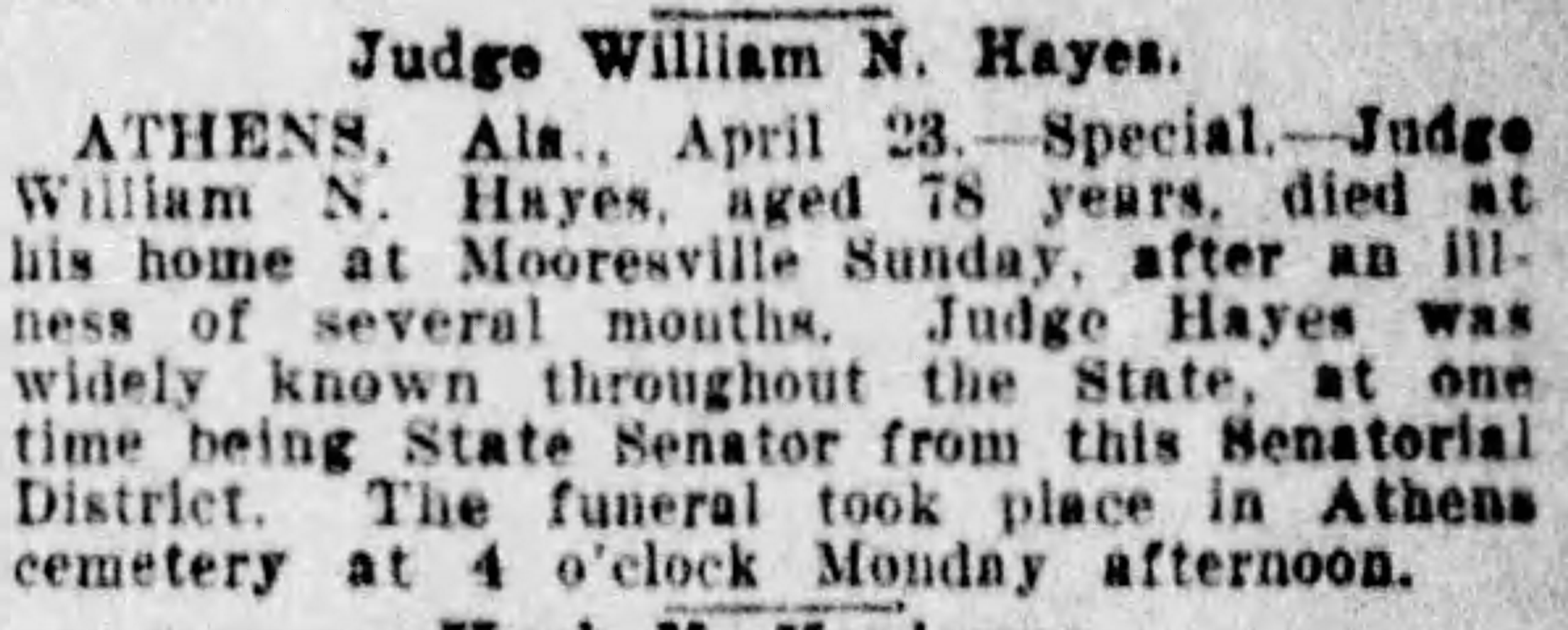
The Birmingham News, Birmingham, Alabama
Tuesday, April 23, 1918, page 13
![]()
Obituary of John Hayes In The Gospel Advocate
John Hayes, age eighty-nine, a minister of the gospel for fifty-eight years, died at his home near Athens, Ala., October 2. He would have been ninety years old on October 20. He had been in bed for about three weeks, during which time he
prepared a tract for publication. He referred to himself, as did others, as “old Brother Hayes.” When the Nashville Bible
School opened, John Hayes was one of six boys to compose the first class. When David Lipscomb and James A. Harding came to the little building on the first morning they found him sitting on the front steps. He was in school for two and a half years. Then for two years he farmed, preaching on Sundays and holding meetings in the summer. He was regarded
as a man who was unswerving in his convictions. He preached in a number of states and was in the pulpit for the last time
back in the summer. The father of thirteen children, he married three times. First, he married Miss Effie Townes who
was a great help to him in his study of the Bible. She taught while he attended the Bible school. To them were born four
children. Only one, Tom, lived to be grown and he died on his way home from the battlefields of the first World War.
After his wife died he moved to DeSoto, Texas, where he married Miss Florence Oliver. To them were born five children.
After her death he moved back to Alabama and in 1919 was married to Miss Helen Kraus of Athens. To them were born
four children. Brother Hayes was of Irish descent, the son of William Norfleet and Mary Eliza Hussey Hayes. He was a
native of Athens, born in a house that stood at Hobbs and North Clinton Street. Funeral services were conducted at the
Market Street church building, October 4, by A. J. Rollings, Bennie Lee Fudge and Burl Grubb. Burial was in Athens
City Cemetery. He is survived by his wife and five daughters, Mrs. Ruth Knowlton of Florida; Mrs. Gladys Farmer,
Dearborn, Mich.; Mrs. Helen Anderson, Birmingham, Ala.; Mrs. Lucile Qualls, Donelson, Tenn.; Mrs. Martha Wakham,
Athens, and one sister, Miss Helen Bee Hayes, Athens.
-Mrs. Lucile Qualls, Gospel Advocate, November 26, 1959, page 766.
![]()
Directions To Grave
The Hayes family plot is located in the Athens City Cemetery. The Parks and Recreation Department controls all the maps of cemeteries. So, if you need more info on particulars, you can check with them.
If coming from Nashville, head down I-65. After crossing the Alabama state line the first major city will be Athens. Take US-31 exit 354 and head south. Turn right on Hobbs Street. The city cemetery will be up on your left. Head up the hill into the cemetery and at the Athens City Cemetery sign head left. Turn right on the second right. The Hayes' plot will be on the left. But it might be easier to look for the flagpole on the right. The graves will be directly across the drive from the flagpole on your left. The GPS was taken from the grave location, so it might be handy to use it. Section 3, Lot #982.
GPS Location
34°48'11.1"N 86°57'42.0"W
pr D.d. 34.803083, -86.961667
![]()
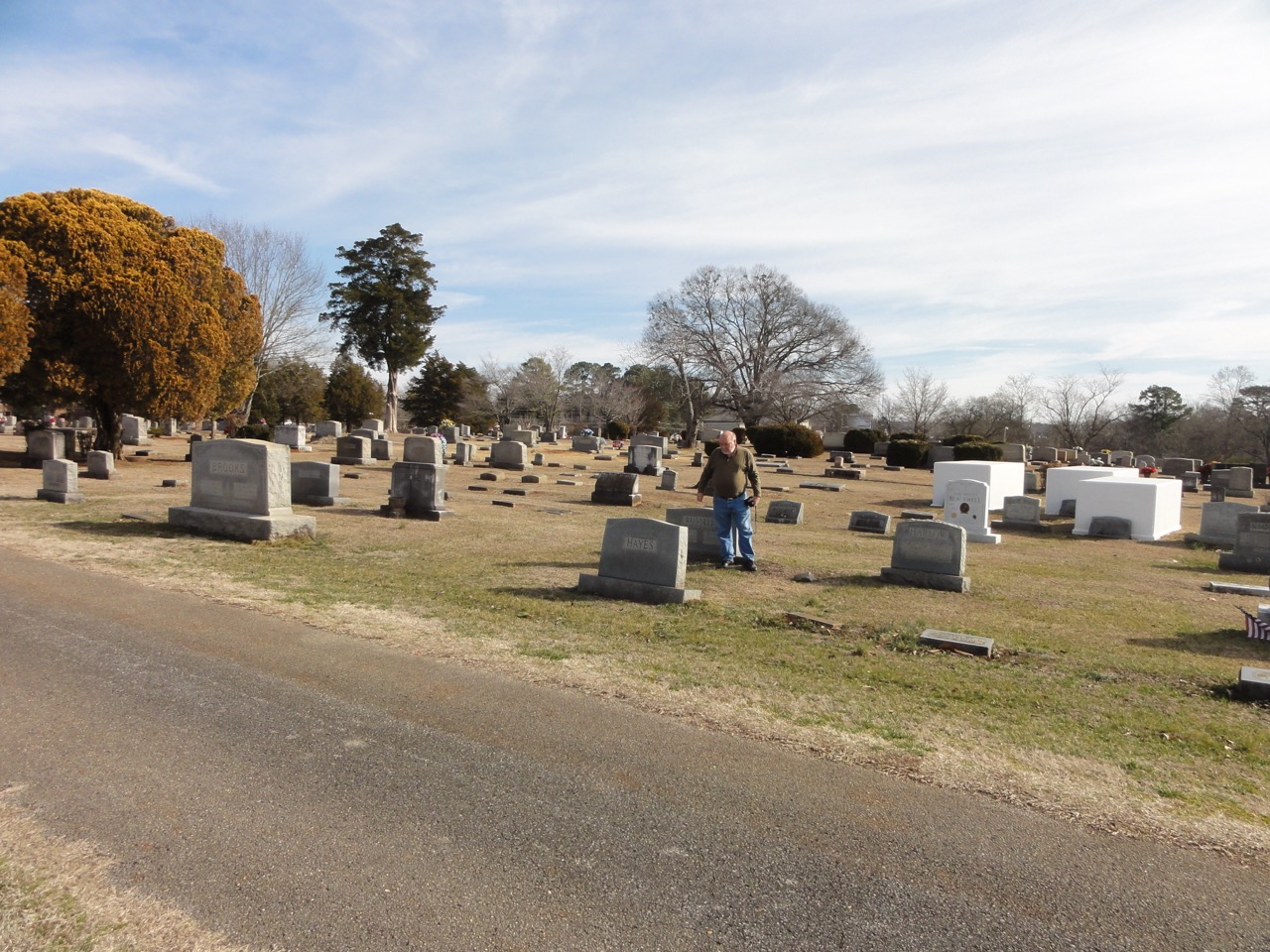
C. Wayne Kilpatrick at the grave of John Hayes - 02.2015
HAYES
Helen K. - August 25, 1901 - September 6, 1986
John - October 20, 1869 - October 2, 1959
I HAVE FOUGHT A GOOD FIGHT I HAVE FINISHED MY
COURSE I HAVE KEPT THE FAITH 2 TIMOTHY 4:7
![]()
Photos Taken 02.06.2015
Webpage Produced 01.17.2024
Courtesy Of Scott Harp
www.TheRestorationMovement.com
Special Recognition: To C. Wayne Kilpatrick for his assistance in finding the grave of John Hayes. Even when we found the grave I did not realize the vast significance of this great man of God. What a life! What a dedicated life to Jesus Christ! It's been a blessing to research his life. I am most thankful he was so good to record his steps by sending messages to the Gospel Advocate and Firm Foundation. Otherwise, only God would have known the vast efforts of sacrifical dedication of John Hayes.
![]()
